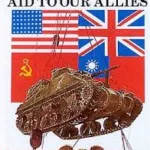No, The Soviet Union Did Not “Do The Most” During World War 2

There is a common trope about World War 2, usually in leftist and anti-American circles. It claims that the Soviet Union were the real drivers of victory in World War 2, not the United States. It posits that the Soviet Union was in the war longer than the US, and lost many more men than the US did, and thus had more of a role in winning the war than the US.
On it’s face, this argument seems quite reasonable. No one can dispute that the Soviet Union lost by far the most people of any country in World War 2. It also was fighting in the war before the US did. It paid for its victory in blood, and had a critical role in defeating Nazi Germany.
If that’s the case, what is my objection? Don’t these aforementioned facts disprove the America-centric narrative of our country being the saviors of World War 2? Well, actually no. The first thing we should address is the idea that losing the most men means that your country played the biggest role in winning the war.
The Soviet Union lost the most amount of people for several reasons. One, the Nazis were initially able to drive deep into Soviet territory. Along the way, they cruelly murdered millions of Soviet civilians. Two, the vast amount of territory of the Soviet Union meant that the Nazis were fighting in large numbers of towns and cities.
Third, the Soviet military was not at the level of the Nazis in terms of technology and sheer power. But what they did have instead was a huge manpower advantage. Adding to the fact that the Nazis were fighting on multiple fronts, while the Soviets were focused almost solely on the Nazis, the Soviets had many more men than the Nazis would have had even in a one on one fight.
The Soviets used their sheer manpower advantage, along with the cruel Russian winter, to wear down the Germans. I want to be clear though. The Soviets did not defeat the Nazis by using human waves. Though they did on occasion shoot their own retreating troops to force them to hold the line.
The Soviets did not beat Germany through human wave tactics, but they did overwhelm the Germans with their numerical advantage. This naturally led to many millions of Soviet deaths. If a military instead has better weapons, technology and tactics, and thus can win more swiftly, and lose less men, it does not mean that they were less important in winning the war.
The US, while entering the war later than the Soviets, was a critical factor in both theaters. The Soviets fought in Asia, but barely had an impact. The US was critical in the fight against both the Nazis and Japan. Against Japan, the US was not just the leading nation, but almost the sole driver of the victory in the Pacific.
Other nations helped against Japan to be sure, but their help was usually supplemental to the US war effort, not an amount that in any way approached what the US did to defeat the Japanese. Meanwhile, in Europe, the US was critical before entering the war, in supplying the Chinese, French, British and the Soviets. America’s Lend Lease was critical for the Soviets especially. A Soviet general even admitted that the Soviets likely would have lost had it not been for America’s Lend Lease.
The US was obviously critical in D-Day, defeating the Nazis in North Africa, and penetrating Axis controlled Europe through Italy. The British were also critical in those theaters, more so than the Soviets. So we must look at who did what in each theater carefully.
What do we find? We find that the US was critical in defeating Japan. No other nation’s contributions there comes close. The US was critical, along with the British, in the D-Day invasion of German controlled Europe in the West. The US was also critical in defeating the Germans in North Africa, and defeating the Italians. The British were also important there.
The Soviets were critical in defeating the Nazis on the Eastern Front. They were also engaged with Japan, but to a considerably lower degree than the US. And America’s industrial base was essential for the contributions the British and Soviets gave.
This article isn’t intended to diminish the contributions of the Soviets, British, or anyone else who helped defeat the Axis in World War 2. It is intended to set the record straight. I know that it’s in fashion to pretend that the US simply makes up stories glorifying itself in everything. That the actual truth is that the US was not that decisive, or at least that there was another nation that was more important.
And this goes into everything. The actual truth is that the US is not benevolent and morally pure in everything it does. But if you get past the straw man, you’ll see that no serious person ever makes the claim that it is. What they do say is that in comparison to other nations, or other world powers, the US does do better.
Anti-Americans who argue in bad faith, and some who genuinely think that the pro-US narrative is not accurate, often conflate the US making mistakes, doing bad things (like all nations), or not being the complete and only reason for victory in World War 2, with the idea that the actual truth is the opposite of what Americans portray it as.
There is a lot of patriotism in the US that goes a bit overboard. But what many foreigners don’t understand is that there is also a lot of visceral, illogical anti-Americanism that goes way overboard, often from Americans themselves. They must also not understand that in actuality, there is constant and sometimes excessive self criticism in America.
In fact, the American media highlights any negative thing that happens in the US with relation to race, guns or political division to such a degree, that foreigners parrot debunked negative caricatures of the US when they criticize the country. In a sense, I can understand why that is. Both the media and anti-Americans have their reasons.
The media does this because they want headline grabbing news. They also do it because they lean left. The left leaning media highlights and exaggerates real problems to a degree that doesn’t accurately represent the country. They do this to try to pressure for change, almost always from a left leaning direction. They also do it to keep alive left wing narratives, especially on the issue of race and immigration.
Foreigners and anti-Americans obviously will take what the left leaning American media shows for a couple reasons. First, because if American media itself is showing something negative, foreign media can’t be accused of making up negative things about the US (although they sometimes do in addition to parroting US media).
Second, other nations’ achievements, power and influence in the world over the last century, are quite diminutive compared to the US. No nation in history has ever had the US’ combination of power, influence, continuous democracy, human rights, scientific and technological achievements, quality of life, and stable government, all in a multi-racial, universal nation that anyone of any race can be a part of.
The US is not the best in every single category listed. But no nation has had that aforementioned combination that the US has. And of course, this fact breeds resentment and jealousy. A desire to take the guy on top down a bit. Which is only human. I actually think its a good inclination to be inclined more for the underdog than the guy on top.
But of course this manifests itself in negative ways. Jealousy and trying to find ways to bring the US down. So of course anti-Americans will seize upon problems in the US, American hypocrisy, or the truth not being as pro-American as the US might have you believe.
But that should not lead to the disregard of nuance and knowledge that while the US has problems, just because it is the big dog does not mean that you can just make up lies about it. If former Soviet leader Nikita Kruschev can admit that “if the United States had not helped us, we would not have won the war,” then I think you can take this as a valid claim.
So we should celebrate what all the nations that helped win World War 2 did. But we should remember that, if we are going to debate who did what, that the US undoubtedly was critical in the most areas, and that losing the most men does not ipso facto mean that you did the most to win the war.


